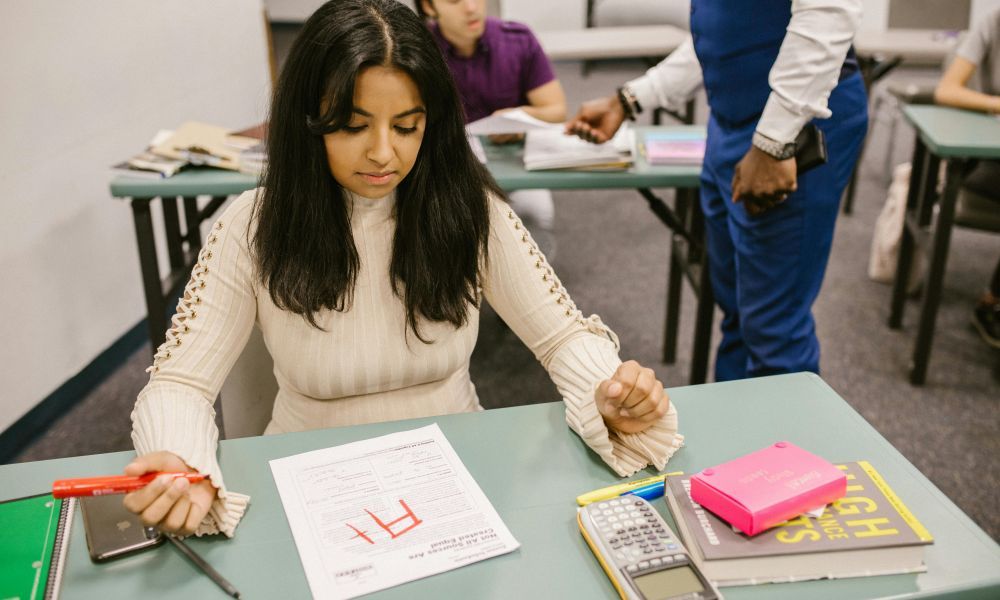Are you a sophomore or a junior considering studying abroad during High School? Or you are a Senior next year and wondering if you could earn your last credits abroad and be ready for high school graduation?
Choose to do a High School abroad during your High School years. You will have a unique chance to experience a different culture, improve one or even several foreign languages, but also enhance your study and career opportunities. Those are the long-term benefits of a school year abroad.
However, you and your parents would probably like to ensure that your school year abroad will contribute to your High School requirements back home and not negatively affect your GPA and graduation.
Thanks to this article, we would like to share some useful information and tips for you to know the steps necessary to earn credits while you study in a High School abroad.
Plan early and cooperate with your school and High School Abroad program
Discuss your project with your school counselor
You must discuss your project to study abroad during High School at the very early stage of the process. It is indeed crucial that your school is aware of and supports you at all stages. Your school counselor will be able to inform you if the school is used to having students studying abroad or if this is new to them. This will determine if they already have a policy in place or if you need to start working on it. Not only your school but sometimes your school district may need to be involved. Make sure to understand the policies that are in place, if any. We suggest that you start talking about it a year before your planned departure.
Make sure to have a clear study plan in plan for your High School years
If not already available, try to work on a global study plan for your high school years. Whether you have one, two, or three years to do up to graduation, have a look at the graduation policy of your school and its course offerings. Determine the credits you still need to achieve as well as the subjects you would be interested in. Make sure to consider which AP subjects you would like to take and when you should plan to attend them. You cannot attend them while abroad unless you attend an American school in Europe.
Get to know the school system of the country where you would like to study
The school system of the host country where you wish to study will probably be very different from what you and your parents are used to. Unless you plan to attend an American school abroad, the high school years will look different. Most countries do not use a credit system. You attend the subjects determined by the Ministry of Education per school year and may have some, usually, limited flexibility in choosing your subjects. In most countries, graduation will most probably be achieved based on success on final exams at the end of the high school years, sometimes over the last 2 years of study. You must learn and understand how school abroad works to make the best of your academic experience. Nacel provides high school students with detailed information on school systems and curricula to help future exchange students get prepared.
Work with your High School Abroad program to determine your possible subjects
Concentrate your efforts on core subjects
Some specific subjects offered in American schools may not be offered abroad: US Government, US History, Health, etc are examples of subjects that are only taught in US high schools. Make sure that you can attend those subjects in your school before or after your school year abroad. Math is also taught differently abroad: while most US schools teach Math in sequences (Algebra 1, Algebra 2, Geometry, Pre-Calculus, Calculus, etc), schools abroad teach math per level so you may do in one math course some Algebra, some Geometry, some Trigonometry or some Calculus. Keep a record of the chapters that the math teacher will cover in class. English abroad is usually an English class for non-native English speakers. It may not be considered an English language arts credit. Some schools abroad may teach Foreign literature in English: such a course may be sometimes considered as an English language arts credit. Detailed curriculum are very important!
Generally speaking, it is safe to concentrate on core subjects :
- Literature: the local Literature or Language course can be considered as a Foreign language credit and sometimes as an elective language arts credit
- Math
- English (under the conditions as above),
- History/Geography (it can for example cover a World History credit)
- Science
- P.E.
Make sure to keep track of your grades during your program abroad
Grade records may also work differently abroad. Some schools abroad use school software: teachers would list your grades during the assessment period (term, semesters depending on countries) and the school would issue a proper grade report at the end of the period with your GPA. Some schools and countries would issue a grade report at the end of the academic year only. Make sure to understand how it works and keep yourself a record of your achievements.
As mentioned earlier we also advise you to keep a record of the chapters covered in each class so that you can concretely explain to your school back home what you have learned while abroad. A general course description may be useful but may not exist, so make sure to :
- Either download the official syllabus from your school or the National Ministry of Education
- Or copy the list of chapters in your textbook
- You may also keep a copy of the tests if you can so that your school back home can understand how you have been assessed.
Do your best to collect official documentation from your school abroad
You need to discuss with your school abroad about the documentation your school back home may require from you. The earlier they know, the earlier they will be able to confirm with you what they will be able to provide or discuss with you alternatives. Do not wait until the last minute, it will be too late for the school to adapt. Make sure to agree with the school admin at the beginning of your stay and eventually inform your teachers as well. You school abroad may or may not be used to those practices so do not take it for granted that they will/can spontaneously do what you would need.
Make the best of your school year abroad
Do not stop communicating with your school counselor when you are abroad
Do not cut the relationship with your school back home. It is important to keep them informed: you may for example send them your timetable when you receive it or share with them intermediary reports. Some schools may be interested in communicating about your experience abroad with your peers. It may be a great way to make it beneficial for others, share your experience with future applicants, and show your involvement to your teachers and for your future College applications.
Document your achievements abroad in a very positive way
Take great care in the way you present your documentation to your home school when you return home :
- If written in the local language, attach a translation of the document;
- If the grading system differs from the one used in your school collect an explanation about grade equivalences;
- Have all your documentation ready when you return home: it is sometimes pretty complicated to collect documentation after you have left the country;
- If you had great contact with some of your teachers abroad, kindly ask them to write you a recommendation, as this may be useful in the future;
- If you participated in a school trip or a specific club or activity with your school, document it as well;
- If you failed in certain subjects, give explanations to your school: the content differed subsequently from the content taught in your school, you did not have the pre-requisites but could not change the subject or your language level did not allow you to perform well, etc. Failure may happen but it is important that you can justify it to your school.
Register for an official language test when you return home
When you return home you will have most probably improved your language level. Be proud of it and show it! We recommend you register for an official language test to prove the level you reached. This can sometimes count as a validated foreign language requirement in some schools will also be a great add-on for your College applications. We also advise that you register for an AP in a Foreign language.
Earn credits beyond your school year abroad
Attend online classes
Your school may require you to earn specific credits that you cannot earn while studying in a high school abroad. Consider taking them online. At Nacel, we do not advise that you attend an online course while you study abroad: you will already be pretty busy with your local school requirements and your life as an exchange student. Plan such a course during the summer before you leave to study abroad or for the summer when you return.
Opportunities for Independent Study
Your school back home may offer to award you with credits for a project conducted abroad. Design a project with a teacher you like and check the teacher’s requirements for your assessment. It can be a great way to link your school year abroad with your studies back home, and again, can be valuable in your College applications.
Book a Summer School
If your school counselor assesses that you can not earn all the credits you need from your study abroad, work on a plan to recover those missing credits. Your school counselor may for example suggest you attend a summer school or take a test to validate if you match with the pre-requisites for the coming school year.
Possible challenges in earning High School credits abroad
School policies regarding programs abroad may defer
Each school in the US may have a different policy regarding credits earned abroad. Each host country may also have its policy, assessment periods, and means. You may feel overwhelmed, inexperienced, and stressed. Discuss your concerns with your High School Abroad program and seek assistance and advice. This is an important topic for you, so communicate and do not try to do everything on your own.
If you feel your school back home is not responsive or cooperative, try to advocate for yourself and show your goodwill. You must have a clear agreement with your school before you go, in writing, so that you can demonstrate you did or try to do what was agreed before. The quality of your documentation will turn in your favor! Do not give up. Be open and negotiate!
Be careful to not be overwhelmed by credit concerns
As mentioned above, earning credits while you study abroad is just part of your experience. Make sure to keep a balance between your needs in credits and your overall experience as a high school exchange student abroad. You travel abroad to experience something different and you will live something very different from your classmates, so do not expect to be able to combine everything perfectly. What will be valuable, besides academics, are :
- the experiences you will have abroad,
- your adaptability skills,
- the way you worked on your study abroad project,
- the knowledge and maturity you will have gained
- the intercultural skills you will have developed
- as well as your language improvement.
Checklist for Students
To sum up, be organized to maximize your chances of earning credits during your school year abroad.
Before leaving your home country:
- Meet with your school counselor before you start inquiring about High School Abroad programs ;
- Work with your school counselor about your High School study plan for the rest of your high school years ;
- Make sure to understand how the school system works in the country where you wish to study ;
- Inform your High School Abroad program that you wish to earn credits and list your needs (make sure to focus on core subjects)
- Discuss with your school counselor about the documentation you will need when you return.
While you attend school abroad :
- Do not forget to keep track of your grades while abroad
- Keep a record of each subject’s curriculum
- Discuss with your school abroad about the documentation you would need to collect
- Anticipate and remind your school about your needs a few weeks before departure
- Make sure to communicate with your school counselor at home so that he/she knows how you are doing academically
When you return home :
- Register for an official language test to show how much you improved while abroad
- Present to your school a complete file with your timetable, a list of your subjects, each subject’s curriculum, your grade report, eventually a letter of attendance
- Follow up with your school counselor to get an update on the school's decision regarding your credits
- Discuss the need or opportunity to attend additional tests, summer school, or online classes to recover your missing credit
- Do not forget to highlight your school year abroad in your College applications
Doing a school year abroad during High School years is a rewarding experience and an investment for your future studies and career. If you have a clear plan in place, show your motivation and commitment in both your home school and your school abroad, and study hard while abroad, you will maximize your chances of earning credits. Interested in learning more? Read our articles about the school system in the country where you wish to study.






